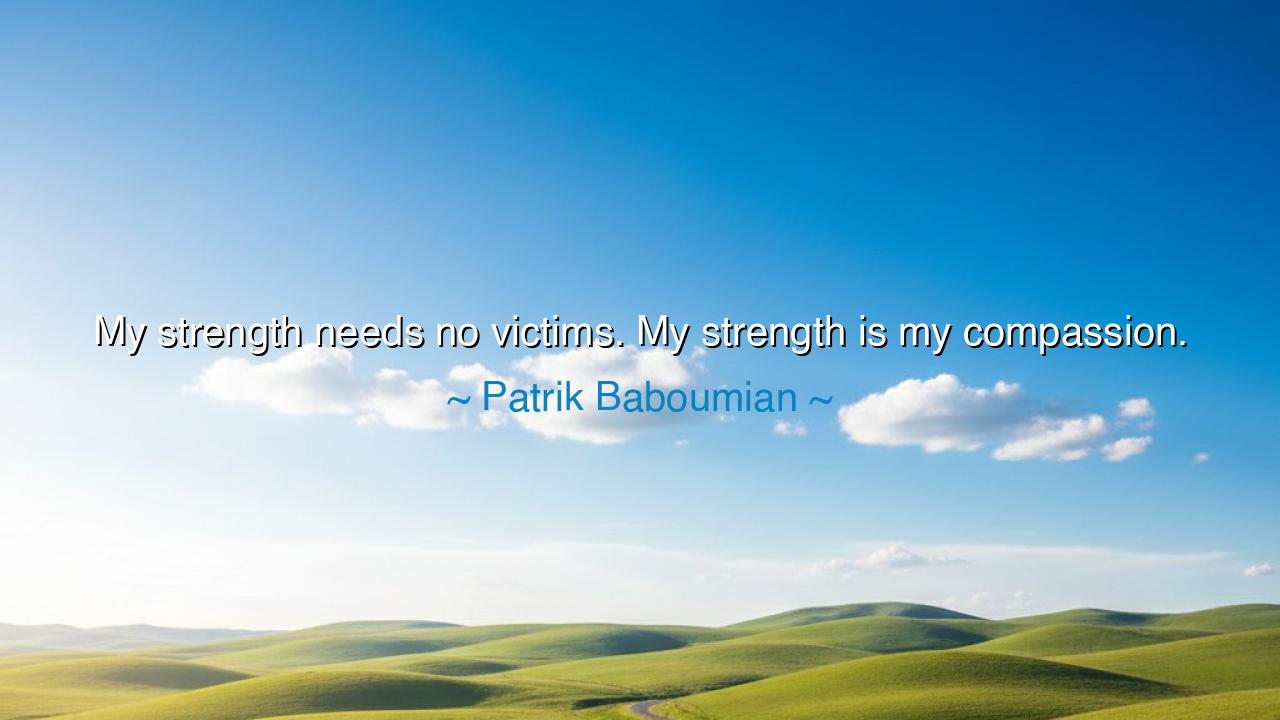
My strength needs no victims. My strength is my compassion.






Patrik Baboumian’s words, “My strength needs no victims. My strength is my compassion,” cut through the noise of the ages like the call of an elder prophet. Here is a man once known for his might in the arena of strongman competitions, yet he declares that true greatness is not found in domination, not in the breaking of others, but in the binding power of mercy. His teaching reveals a profound truth: that the highest strength is not destruction, but the will to protect, uplift, and spare.
Baboumian, famed as one of the world’s strongest men and a champion of plant-based living, speaks from a place that unites physical power with ethical conviction. His words are born from a life that disproves the ancient lie that compassion is weakness. He carries weights that would crush ordinary men, yet he refuses to crush the lives of animals for sustenance. His declaration is both a personal creed and a challenge to the world: the hand that could destroy chooses instead to shelter, and therein lies true strength.
History itself bears witness to this truth. Consider the example of Mahatma Gandhi, who led a nation to freedom without sword or cannon. Though he possessed no armies, his strength was unyielding because it was rooted in compassion for all. He faced empires with nothing but nonviolence, and he prevailed, showing that strength which does not demand victims endures longer than power that rules through fear. His legacy, like Baboumian’s message, teaches us that might married to compassion transforms history.
Even in the ancient world, there are echoes of this teaching. The emperor Marcus Aurelius, though supreme in authority, wrote in his Meditations that true power lies in ruling one’s own spirit and treating others with dignity. The gladiator may win the crowd through blood, but the ruler who tempers justice with mercy builds a legacy that outlasts steel. Thus, Baboumian’s words stand in harmony with the wisdom of ages: compassion magnifies strength rather than diminishes it.
This lesson also confronts our daily lives. How often do people measure strength by how loud they can speak, how many they can defeat, how much they can hoard? Yet such strength is fleeting, for it requires victims to prove itself. The strength of compassion, however, grows endlessly, for it builds rather than destroys, heals rather than wounds. To live by this principle is to draw from a well that never runs dry.
For those who seek to embody this teaching, consider the practice of restraint and empathy. When anger rises, choose patience; when you have power over another, use it to uplift rather than oppress. Let your strength be measured not by victories over others but by the lives you enrich, the burdens you help bear, and the kindness you extend even when it is hardest to give.
The practical path forward is clear: cultivate compassion as fiercely as you cultivate skill or endurance. Seek out the vulnerable not to exploit but to protect. Use your influence not to dominate but to elevate. In this way, you will find a strength that requires no victims, a power that leaves no scars but instead sows flourishing in its wake.
Thus, let this teaching be written on the hearts of future generations: strength without compassion is tyranny, but strength with compassion is divinity. Baboumian’s words remind us that the mightiest act is not to crush, but to spare; not to conquer, but to care. And those who walk this path will be remembered not merely as strong, but as truly great.






AAdministratorAdministrator
Welcome, honored guests. Please leave a comment, we will respond soon